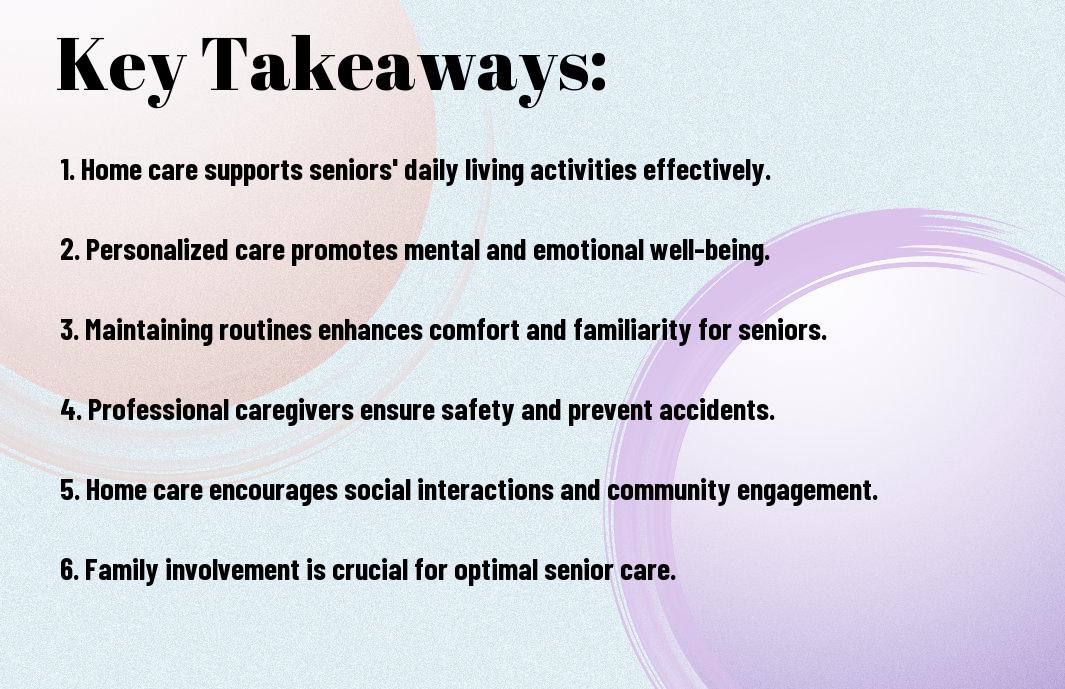There’s a growing recognition of the importance of independence for seniors wishing to live at home as they age. Many elderly individuals face challenges that can jeopardize their ability to manage daily tasks effectively, leading to feelings of isolation and diminished self-worth. Home care services offer necessary support, enabling them to maintain their autonomy while receiving the necessary assistance for daily activities. By providing tailored services, these caregivers enhance not only their safety but also their overall quality of life, allowing them to thrive in the comfort of their own homes.
Key Takeaways:
- Home Care Services: Professional home care can provide crucial support, allowing seniors to maintain their independence while receiving assistance with daily activities.
- Personalized Care Plans: Tailored care plans ensure that individual needs and preferences are met, promoting comfort and a sense of autonomy for seniors in their own homes.
- Social Interaction: Regular visits from caregivers can combat loneliness and foster social interactions, contributing to the overall well-being and mental health of seniors living at home.

Understanding Home Care for Seniors
The concept of home care for seniors is becoming increasingly popular as it allows individuals to maintain their independence while receiving necessary support. Aging in Place: Growing Older at Home is a vital aspect of this approach, ensuring seniors can thrive in familiar environments surrounded by loved ones.
Types of Home Care Services
Understanding home care services can significantly assist seniors and their families in navigating available options. The most common types of services include:
| Personal Care | Assistance with daily living activities, such as bathing and dressing. |
| Companionship | Support in social interactions and engagement to reduce feelings of loneliness. |
| Home Health Care | Medical care provided by licensed professionals for chronic conditions. |
| Homemaker Services | Help with household tasks like meal preparation and cleaning. |
| Respite Care | Temporary relief for primary caregivers to prevent burnout. |
Though understanding these options can be overwhelming, they are necessary for ensuring a senior’s safety and comfort in their home.
Benefits of Home Care
Home care offers numerous advantages for seniors, enhancing their quality of life. Through personalized support, seniors can remain in their own homes, receiving care that promotes independence and dignity.
A key benefit of home care is the provision of tailored services that cater to individual needs, allowing seniors to engage in daily activities at their own pace. This environment fosters a sense of independence while ensuring they receive the necessary assistance they may require. Additionally, home care ensures companionship and social connection, which can combat feelings of isolation. These positive aspects, combined with professional oversight, can lead to improved physical and emotional health. Ultimately, home care is a vital resource that empowers seniors to live fulfilling lives in the safety and comfort of their homes.
Promoting Safety and Accessibility
Clearly, ensuring a safe and accessible living environment is crucial for seniors who wish to maintain their independence at home. Home care services can assess the unique needs of each individual, recommend modifications, and implement strategies that help reduce risks while enhancing comfort and usability in the home. This proactive approach allows seniors to navigate their surroundings safely, promoting confidence and autonomy.
Home Modifications
With simple home modifications, such as installing grab bars in bathrooms, using non-slip mats, and eliminating trip hazards, seniors can significantly enhance their safety. These adjustments not only create a more accessible environment but also support seniors in performing daily tasks with greater ease and security, ultimately fostering a sense of independence.
Fall Prevention Strategies
For seniors, falls can be a serious health risk. Implementing effective fall prevention strategies is vital for maintaining independence and safety. This includes regular exercise to improve strength and balance, as well as utilizing assistive devices such as walkers or canes when necessary.
Another vital aspect of fall prevention is the importance of creating a safe environment. Seniors should regularly remove clutter and ensure all pathways are well-lit. Utilizing non-slip rugs and maintaining clear walkways can help reduce the risk of accidents. Additionally, seniors are encouraged to wear appropriate footwear that provides adequate support. By actively implementing these strategies, they can significantly diminish the likelihood of falls, promoting both safety and independence in their home environment.
Personalized Care Plans
After understanding that each senior has unique needs, creating personalized care plans becomes imperative. These tailored plans may include daily routines, health monitoring, and companionship, ensuring that seniors can live comfortably at home. For more information, visit Caregivers Corner: The benefits of in-home care: a path to …, which discusses how individualized support can enhance independence.
Assessing Individual Needs
With the right approach, home care professionals can effectively assess the unique needs of each individual. This assessment includes understanding medical conditions, personal preferences, and daily living challenges, allowing caregivers to provide meaningful support tailored to the individual’s circumstances.
Developing a Care Strategy
Care strategies are crucial in ensuring that seniors receive the appropriate level of assistance. It is important for caregivers to create comprehensive strategies that address not only physical needs but also emotional and social aspects of care. This might include scheduling regular health check-ups, developing a nutritious meal plan, and planning engaging activities to prevent isolation.
It is vital that the care strategy remains flexible and adaptable, as seniors’ needs can change over time. This might involve adjusting care tasks, coordinating with healthcare providers, or incorporating new support services. Ultimately, the goal is to foster a sense of independence while ensuring safety and overall well-being, empowering seniors to thrive in their home environment.
Social and Emotional Support
Despite the challenges of aging, many seniors can maintain their independence at home with the proper social and emotional support. Home care services can play a significant role in providing companionship and understanding, which is crucial for their overall well-being. By addressing both the social and emotional needs of seniors, these services help to create a fulfilling and enriching environment that enhances their quality of life.
Combating Loneliness
To combat loneliness, home care professionals can engage seniors in meaningful conversations and activities, creating a sense of companionship and belonging. This personalized interaction helps to alleviate feelings of isolation, thereby improving their emotional health.
Encouraging Social Engagement
One effective way to promote well-being in seniors is by encouraging social engagement. This involves facilitating opportunities for them to connect with friends, family, and community activities, which can significantly boost their mood and sense of purpose.
This social engagement is vital for seniors as it not only combats feelings of loneliness but also fosters a supportive network that can enhance their overall mental health. Regular interactions with peers and involvement in local community events can lead to increased happiness and lower risks of depression. Furthermore, staying active within their community encourages seniors to share their experiences and build meaningful relationships, ultimately facilitating a stronger sense of belonging and purpose. This support network is vital for maintaining their independence and emotional well-being.
Maintaining Physical Health
Many seniors face challenges in maintaining their physical health, yet it is crucial for their independence and overall well-being. Home care services can play a vital role in managing health-related issues by providing personalized support that encourages seniors to stay active and make healthier lifestyle choices. Quality home care can help seniors navigate their daily health routines, ensuring they receive the care and attention necessary for thriving in their own homes.
Nutrition and Meal Preparation
The importance of proper nutrition cannot be overstated for seniors aiming to maintain their physical health. Home care professionals assist in meal planning and preparation, taking dietary restrictions and preferences into account. This support helps seniors enjoy balanced meals that fuel their bodies, promote better health, and enhance their quality of life.
Exercise and Mobility Assistance
The ability to stay active is integral to a senior’s physical health. Home care providers offer tailored exercise plans and mobility assistance, helping seniors engage in physical activities safely. Such support may include reaching for items, walking, or participating in group exercises that foster not only fitness but also social interaction.
Exercise is imperative for seniors to maintain strength, flexibility, and overall health. Home care professionals encourage regular physical activity tailored to each senior’s abilities, promoting increased mobility and reduced risk of falls, which is a common concern among older adults. They provide safe supervision and assistance during exercise routines, ensuring that seniors can participate without risking injury. This guidance not only helps maintain physical health but also supports mental well-being by promoting independence, confidence, and a sense of achievement.

Financial Considerations
Now, understanding the financial aspects of home care is important for seniors wishing to maintain their independence. As they assess their options, it’s crucial to recognize costs associated with services and how they can align with their current financial situation. With proper planning, seniors can find a balance that supports their needs while ensuring financial security.
Insurance and Coverage Options
Insurance can significantly impact the affordability of home care services. Many seniors may have health insurance plans that cover specific home care situations, such as skilled nursing or therapy, while others may rely on Medicare or Medicaid for assistance. Understanding the details of these plans can help seniors and their families make informed decisions regarding their care.
Budgeting for Home Care Services
With careful budgeting, seniors can effectively allocate funds for home care services without compromising their financial stability. This budgeting should involve assessing their monthly expenses, available income, and determining the level of care needed based on individual circumstances.
A well-thought-out budget is key to managing expenses associated with home care services. Seniors must consider any hidden costs, such as transportation or extra assistance not covered by insurance, which can add up over time. Additionally, they should evaluate their income sources and explore potential benefits from government programs designed for senior support. Establishing a clear financial plan not only offers peace of mind but also allows seniors to focus on their well-being and independence.
Conclusion
Hence, maintaining independence at home is necessary for seniors to thrive, and home care services play a crucial role in this endeavor. By providing personalized assistance, companionship, and support with daily activities, home care enables seniors to live comfortably and safely in their own environments. As they receive the right care tailored to their individual needs, they can enjoy enhanced quality of life while preserving their autonomy, ultimately allowing them to age gracefully and confidently in familiar surroundings.
FAQ
Q: How can home care services help seniors maintain their independence at home?
A: Home care services provide imperative support that enables seniors to live independently in the comfort of their own homes. Caregivers can assist with daily activities such as bathing, dressing, meal preparation, and medication management. Additionally, they can offer companionship and social interaction, which can alleviate feelings of loneliness or isolation. By providing personalized support tailored to individual needs, home care ensures that seniors can maintain their routines and lifestyles while receiving the help they require to stay safe and comfortable.
Q: What types of home care services are available for seniors?
A: There are a variety of home care services available to cater to the diverse needs of seniors. These services include personal care (support with bathing, grooming, and dressing), home health care (skilled nursing services), companionship (providing emotional support and social interaction), respite care (temporary relief for family caregivers), and specialized care for conditions such as dementia or chronic illnesses. Families can work with home care agencies to create a customized care plan that addresses specific needs and preferences, ensuring that seniors receive the most appropriate and effective support.
Q: How do families choose the right home care provider for their loved ones?
A: Choosing the right home care provider involves thorough research and careful consideration of several factors. Families should start by evaluating their loved one’s specific needs and preferences, including the level of assistance required and any medical conditions that may necessitate specialized care. It’s important to look for licensed and accredited agencies with a good reputation, positive reviews, and qualified caregivers. Families should interview potential providers, inquire about their experience and training, and ask for references. Additionally, discussing care plans, costs, and any available insurance coverage can help families make an informed decision that best supports their loved one’s independence and quality of life at home.

